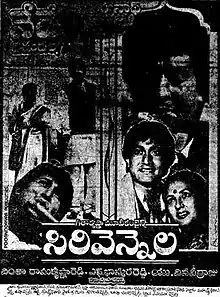Sirivennela
Sirivennela (English: The Moonlight) is a 1986 Indian Telugu-language romance film, written and directed by K. Viswanath. The film won Nandi Awards for Best lyrics, Best Male Playback Singer, Best Cinematography and Best Supporting Actress. The film was screened at the Asia Pacific Film Festival, the International Film Festival of India, the Moscow Film Festival and the AISFM Film Festival.[1][2] The film was shot in Jaipur and Kerala. The film had Hariprasad Chaurasia's flute rendering and a cameo of drummer Sivamani.[3] The film was dubbed in Tamil as Raaga Devathai.[4]
| Sirivennela | |
|---|---|
 | |
| Directed by | K. Viswanath |
| Produced by | Ch. Ramakrishna Reddy N. Bhaskara Reddy Ujjuri Chinaveerraju |
| Written by | K. Viswanath (story) Sainath Thotapalli (dialogues) Sirivennela Sitaramasastri (lyrics) |
| Starring | Sarvadaman Banerjee Suhasini Moon Moon Sen Meena S. K. Misro |
| Music by | K. V. Mahadevan Hariprasad Chaurasia (flute renderings) Sivamani (drums) |
| Cinematography | M. V. Raghu |
| Edited by | G. G. Krishna Rao |
Release date |
|
Running time | 181 minutes |
| Language | Telugu |
Plot
Hari Prasad (Sarvadaman Banerjee), a blind flutist lives along with his younger sister in a village near Jaipur, which was also a tourist attraction. Though he lacks knowledge of classical music, he plays flute beautifully and makes a living by playing it to tourists. One day, guide Jyothirmai (Moon Moon Sen) comes there along with a bunch of tourists and listens to his flute. She understands his talent and helps him understand nature and to become a famous flutist. Years pass and Hari Prasad becomes Pandit Hari Prasad. Unknown to her, Hari Prasad admires her very much and dedicates all his albums to her. Meanwhile, a mute painter Subhashini (Suhasini) who meets him in his village, falls for him.
Subhashini expresses her feelings through her paintings and gradually her brother understands her feelings regarding Hari Prasad. He approaches Hari Prasad's uncle with a marriage proposal. But at the same time Hari Prasad reveals his admiration for Jyothirmai. This shocks Jyothirmai as she previously worked as an escort to rich tourists. She tries to hint Hari Prasad about her not so decent past, but is overwhelmed by his pure love and disregard for her external characters. Though she herself admires him, she feels that she would taint him with her impure past. She tells Hari Prasad that she couldn't marry him as she already engaged to a doctor. Hari Prasad takes it well as he always wanted Jyothirmai to be happy.
On the wedding day, Jyothirmai commits suicide and requests in her last note that her eyes should be donated to Hari Prasad. She also requests that her funeral procession should appear like a marriage procession and her death should be hidden from Hari Prasad. Everyone tries to act normal and sends her as they are sending a bride to her in-laws. Hari Prasad keeps calm all the time and at last goes to the graveyard to say his final goodbyes to Jyothirmai. He tells shocked Subhashini that it's impossible to hide the death of his angel from him. The film ends with Hari Prasad and Subhashini mourning silently in the graveyard.
Cast
- Sarvadaman Banerjee as Pandit Hari Prasad
- Suhasini as Subhashini
- Moon Moon Sen as Jyotirmayi
- Meena as Baby Meena
- Samyuktha as Hari's sister
- J. V. Ramana Murthi
- S. K. Misro
- Shubha
- Sakshi Ranga Rao
- Subhalekha Sudhakar
- Varalakshmi
- Eashwara Rao
- Nithya Ravindran
Music
Sirivennela abounds in classical music composed by K. V. Mahadevan with flute renditions by the renowned flautist Hariprasad Chaurasia.[5] The movie saw the debut of Sirivennela Sitaramasastri as a lyricist, who wrote all of the songs. Because of "the wonderful songs," rich in meaning, he penned for the movie, Sitarama Sastry has taken the name Sirivennela. Each of the songs is remembered to this day.
The song "Vidhata Thalapuna", sung by S. P. Balasubrahmanyam and P. Susheela, is about Aum, the most sacred syllable in Hinduism, from which the Veda traditions originated. Other notable songs include "Adibhikshuvu Vadinedi Koredhi" and "Ee gali Ee Nela."
All lyrics are written by Sirivennela Sitaramasastri; all music is composed by K. V. Mahadevan.
| No. | Title | Singer(s) | Length |
|---|---|---|---|
| 1. | "Adibhikshuvu Vadinedi Koredhi" | S. P. Balasubrahmanyam | |
| 2. | "Chandamama Raave" | B. Vasantha,P.Susheela, S. P. Balasubrahmanyam | |
| 3. | "Chinuku Chinuku" | S. P. Balasubrahmanyam | |
| 4. | "Ee Gali Ee Nela" | S. P. Balasubrahmanyam | |
| 5. | "Merise Taraladeroopam" | S. P. Balasubrahmanyam | |
| 6. | "Patallo" | Prakash Rao, P. Susheela | |
| 7. | "Prakruthi Kanthaku" | S. P. Balasubrahmanyam | |
| 8. | "Polimeradhatipothunna" | S. P. Balasubrahmanyam, B. Vasantha | |
| 9. | "Vidhata Thalapuna" | S. P. Balasubrahmanyam, P. Susheela | |
| 10. | "Kanne mooga manasu" | P. Susheela |
Awards
| Year | Nominee / work | Award | Result |
|---|---|---|---|
| 1986 | Sirivennela Sitaramasastri (for "Vidatha Talapuna") |
Nandi Award for Best Lyricist | Won |
| S. P. Balasubrahmanyam (for "Vidatha Talapuna") |
Nandi Award for Best Male Playback Singer | Won | |
| Moon Moon Sen | Nandi Award for Best Supporting Actress | Won | |
| M. V. Raghu[6] | Nandi Award for Best Cinematographer | Won |
References
- The films of K. Viswanath — AISFM Blog
- Krishnamoorthy, Suresh (26 January 2012). "If music is the food of love, lyrics are the soul". The Hindu. Chennai, India.
- Sirivennela (1986) – Filming Locations – IMDb
- https://news.google.com/newspapers?nid=P9oYG7HA76QC&dat=19870724&printsec=frontpage&hl=en
- listing-index.ebay.com/movies/Sirivennela.html
- "The saga of a lensman". The Hindu. Chennai, India. 9 June 2003.